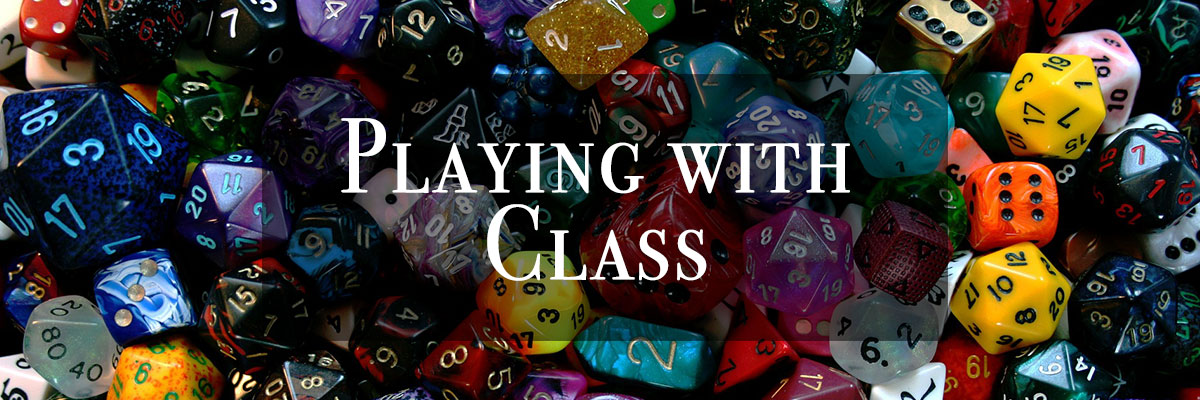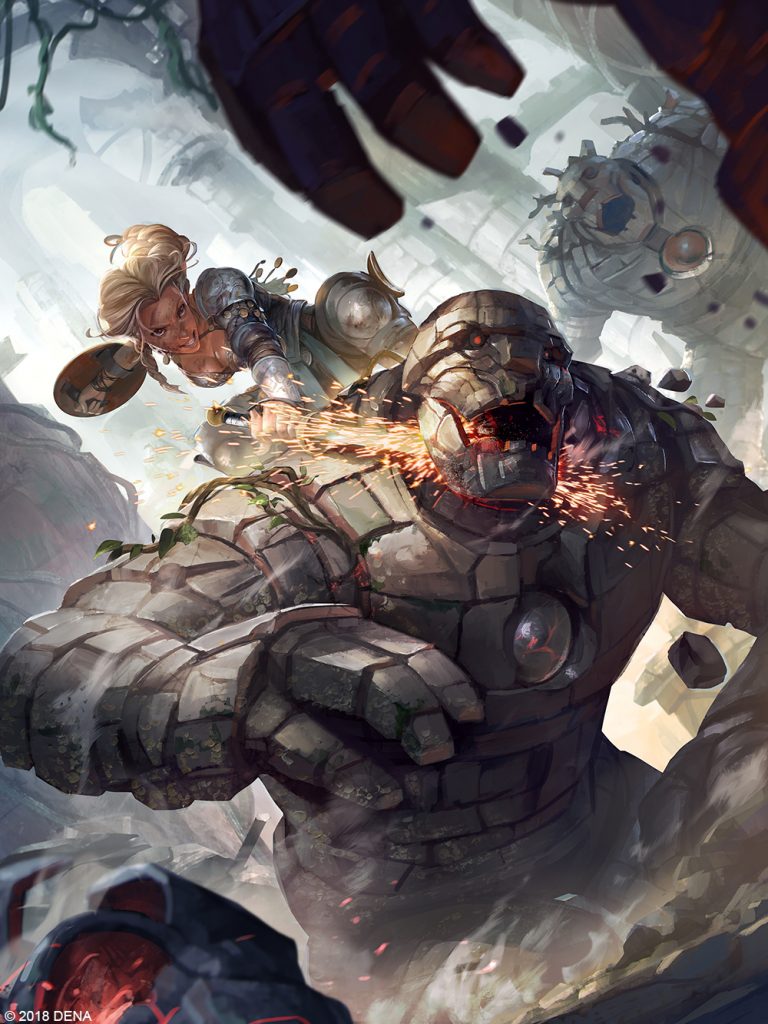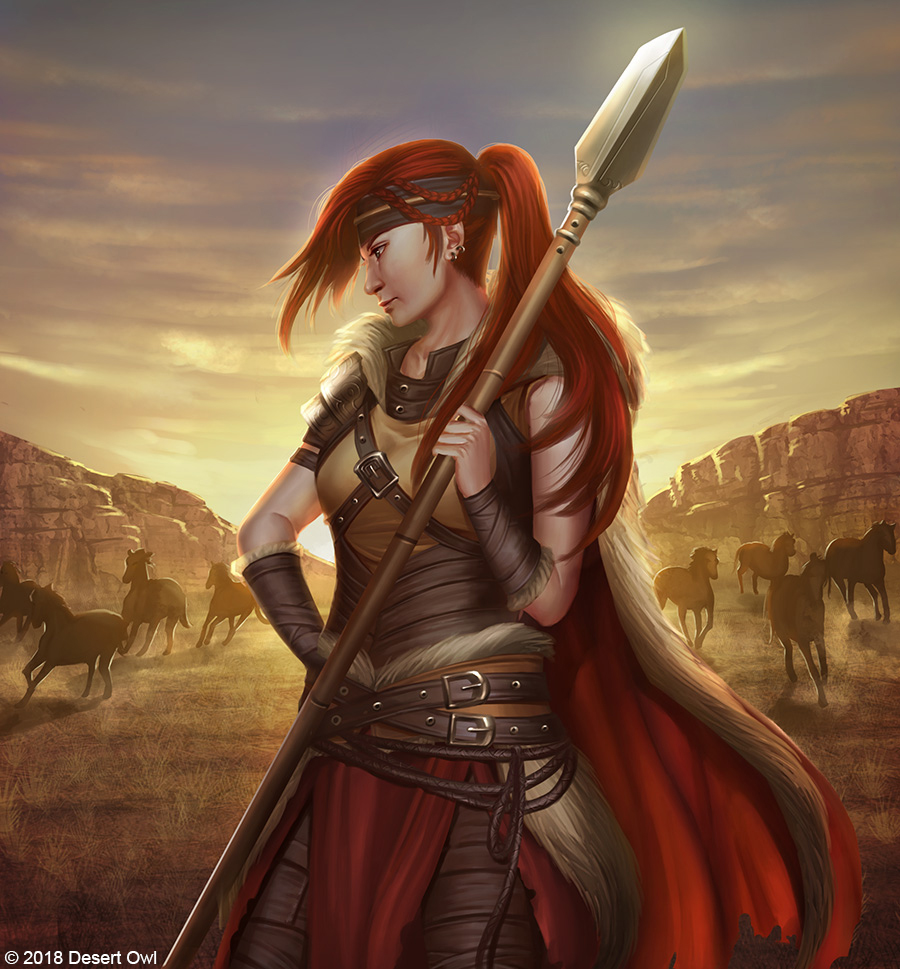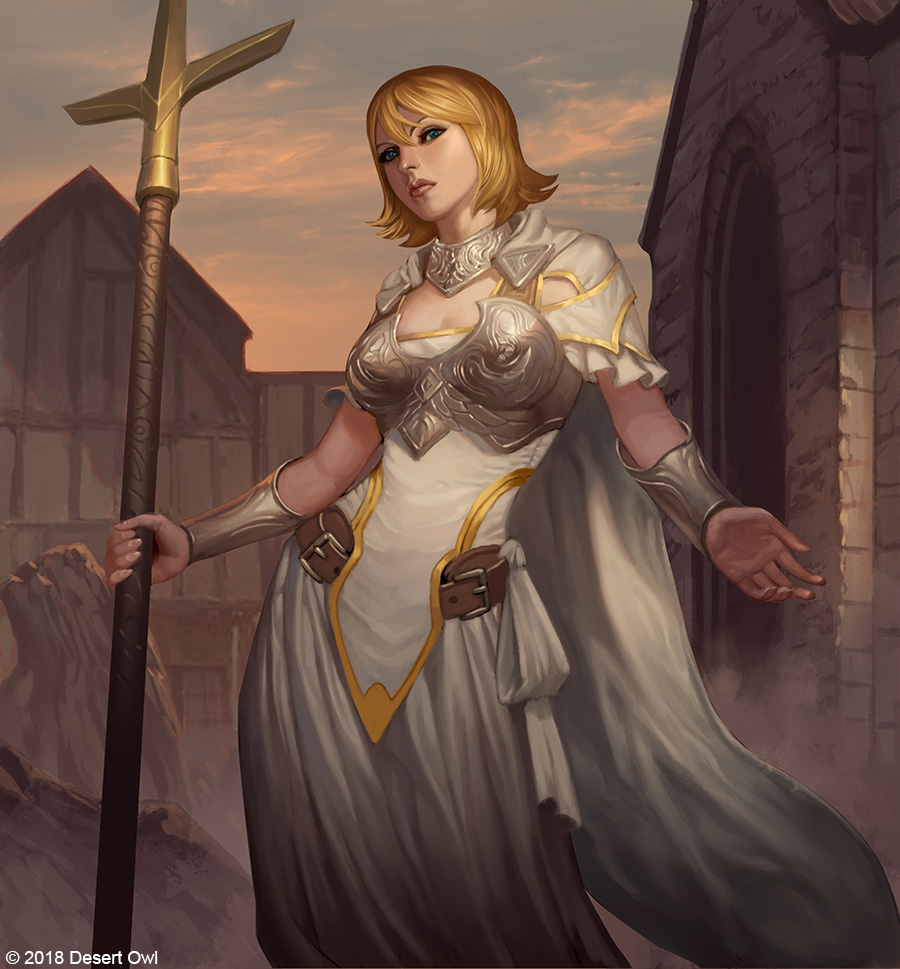Playing With Class

There are many facets to the game of Dungeons and Dragons. It is a unique gaming experience where the players of the game choose a race and class from the Player’s Handbook when creating their characters, which is a core mechanic to how the game feels and operates during your adventures at the table. Choosing a race might seem easy to understand if you have seen any sort of fantasy movies, or read a fantasy novel. However, if you have never really played an RPG (Role Playing Game), but have seen Lord of the Rings, Game of Thrones, or any other fantasy film, you may not really understand what picking a class entails.
When you open up the player’s handbook and scan the table of contents, you will see a chapter on classes which lists: Barbarian, Bard, Cleric, Druid, Fighter, Monk, Paladin, Ranger, Rogue, Sorcerer, Warlock, and Wizard. The list can seem overwhelming if you have no idea what each of them represents. Some of them are easy enough to understand, such as wizard, fighter, or rogue. Others, however, may seem very foreign, like paladin, or sorcerer. Below, we will explore what classes are and why you may choose one over the other.
Choosing your Class
When you sit down to create your character as a new player or veteran, one of the main things you need to figure out is what will your hero will be like, and how will they interact with the world around them. Class will play a major role in helping you answer those questions. It will establish what actions they can take in combat encounters, and social encounters. The class you choose will be more than a profession, it is a life choice for your character, and it helps define how they see the world around them, guiding them along their path.
Barbarian

The barbarian is a class that offers you a Conan-like style life, a wild warrior that specializes in brute force, strength of will and nature-based proficiencies. When in combat your barbarian is driven by a furious rage aiding their physical prowess, granting them extra benefits during those encounters. However, because they have spent much of their lives in the wilderness, they may not be well versed in the ways of city folk. This does not mean they do not play well with others, it just means they generally are not practiced in the skills it takes to manage many social interactions.
Bard
The bard is the musical support class of the party, offering inspirational tunes and song to aid their allies in and out of combat. They have spent the better part of their lives prior to adventuring in taverns, towns, cities and large social gatherings honing their skills of persuasion and performance. Their skills have been honed around the social environment affording them certain skills allowing them to be a valued resource to any party that stops into a town along the adventuring route.
Cleric
The cleric brings the faith to the party, offering divine assistance to their adventuring companions. A cleric is generally a support role, an individual who aids their allies in various situations. However, some clerics can be fierce combat opponents, striking down their enemies with divine fury! Clerics are guided by their god or goddesses, they can be a game changer in many crucial encounters, calling upon their divine connection to heal, bless, or even shield their friends if the need arises. The cleric is a unique class to Dungeons and Dragons, as it brings in another element to the world you are playing in. Clerics are guided by their faith; it drives their actions and gives them a different perspective from how others might see the world around them. Some clerics may follow a divine path that follows a good and virtuous path, while others may follow a more sinister deity which guides them down a more devious path causing harm or chaos instead of law and order.
Druid
The druid brings a nature-based element to the party; having spent their lives surrounded by nature, communing with it, and living among the wild life. However, unlike the cleric, the deities do not need to be part of who they are. Druids draw their powers from the natural world around them, channeling it into spells that can aid them in combat, or transform them into mighty beasts! Druids are not only forces of nature, but they can also be beneficial when dealing with humanoids in social interactions using their generally calm nature to guide them through more tricky personal situations.

Fighter
The fighter is a master of arms and armor, wading in the sea of battle with ease. Defeating their foes in combat is their specialty. From the start, the fighter tells you their lifestyle; they have honed their skills through combat and have expertise in many weapons and armor. Their adaptability gives them a chance to pick up any weapon and generally succeed with it, if the dice gods are smiling upon them of course. The fighter, or warrior, may seem like a simple class to choose, but their abilities later on in levels offer you a plethora of options, making the fighter an in-depth and fun class to play. The fighter is not some dumb brute walking around smacking things with his big club (well, he may be, if you wish to play that way!), but they can be a very unique class to play because of how versatile they are. If you blend the class with the right background, your fighter can succeed in many combat encounters, and be a sly conversationalist as well!
In the next series, we will touch upon the next five classes in the player’s handbook, finishing up with the warlock, wizard and then the party make up, and if it is necessary in fifth edition dungeons and dragons.

Daniel Colby
Dungeon Master by day, mad illusionist by night!
Daniel Colby has just recently entered into the realm of freelance writing. He has a couple of article series’ on the Kobold Press website along with some self published adventures on the DMs Guild.
1 Comment
Leave a Reply
Playing With Class

There are many facets to the game of Dungeons and Dragons. It is a unique gaming experience where the players of the game choose a race and class from the Player’s Handbook when creating their characters, which is a core mechanic to how the game feels and operates during your adventures at the table. Choosing a race might seem easy to understand if you have seen any sort of fantasy movies, or read a fantasy novel. However, if you have never really played an RPG (Role Playing Game), but have seen Lord of the Rings, Game of Thrones, or any other fantasy film, you may not really understand what picking a class entails.
When you open up the player’s handbook and scan the table of contents, you will see a chapter on classes which lists: Barbarian, Bard, Cleric, Druid, Fighter, Monk, Paladin, Ranger, Rogue, Sorcerer, Warlock, and Wizard. The list can seem overwhelming if you have no idea what each of them represents. Some of them are easy enough to understand, such as wizard, fighter, or rogue. Others, however, may seem very foreign, like paladin, or sorcerer. Below, we will explore what classes are and why you may choose one over the other.
Choosing your Class
When you sit down to create your character as a new player or veteran, one of the main things you need to figure out is what will your hero will be like, and how will they interact with the world around them. Class will play a major role in helping you answer those questions. It will establish what actions they can take in combat encounters, and social encounters. The class you choose will be more than a profession, it is a life choice for your character, and it helps define how they see the world around them, guiding them along their path.
Barbarian

The barbarian is a class that offers you a Conan-like style life, a wild warrior that specializes in brute force, strength of will and nature-based proficiencies. When in combat your barbarian is driven by a furious rage aiding their physical prowess, granting them extra benefits during those encounters. However, because they have spent much of their lives in the wilderness, they may not be well versed in the ways of city folk. This does not mean they do not play well with others, it just means they generally are not practiced in the skills it takes to manage many social interactions.
Bard
The bard is the musical support class of the party, offering inspirational tunes and song to aid their allies in and out of combat. They have spent the better part of their lives prior to adventuring in taverns, towns, cities and large social gatherings honing their skills of persuasion and performance. Their skills have been honed around the social environment affording them certain skills allowing them to be a valued resource to any party that stops into a town along the adventuring route.
Cleric
The cleric brings the faith to the party, offering divine assistance to their adventuring companions. A cleric is generally a support role, an individual who aids their allies in various situations. However, some clerics can be fierce combat opponents, striking down their enemies with divine fury! Clerics are guided by their god or goddesses, they can be a game changer in many crucial encounters, calling upon their divine connection to heal, bless, or even shield their friends if the need arises. The cleric is a unique class to Dungeons and Dragons, as it brings in another element to the world you are playing in. Clerics are guided by their faith; it drives their actions and gives them a different perspective from how others might see the world around them. Some clerics may follow a divine path that follows a good and virtuous path, while others may follow a more sinister deity which guides them down a more devious path causing harm or chaos instead of law and order.
Druid
The druid brings a nature-based element to the party; having spent their lives surrounded by nature, communing with it, and living among the wild life. However, unlike the cleric, the deities do not need to be part of who they are. Druids draw their powers from the natural world around them, channeling it into spells that can aid them in combat, or transform them into mighty beasts! Druids are not only forces of nature, but they can also be beneficial when dealing with humanoids in social interactions using their generally calm nature to guide them through more tricky personal situations.

Fighter
The fighter is a master of arms and armor, wading in the sea of battle with ease. Defeating their foes in combat is their specialty. From the start, the fighter tells you their lifestyle; they have honed their skills through combat and have expertise in many weapons and armor. Their adaptability gives them a chance to pick up any weapon and generally succeed with it, if the dice gods are smiling upon them of course. The fighter, or warrior, may seem like a simple class to choose, but their abilities later on in levels offer you a plethora of options, making the fighter an in-depth and fun class to play. The fighter is not some dumb brute walking around smacking things with his big club (well, he may be, if you wish to play that way!), but they can be a very unique class to play because of how versatile they are. If you blend the class with the right background, your fighter can succeed in many combat encounters, and be a sly conversationalist as well!
In the next series, we will touch upon the next five classes in the player’s handbook, finishing up with the warlock, wizard and then the party make up, and if it is necessary in fifth edition dungeons and dragons.

Daniel Colby
Dungeon Master by day, mad illusionist by night
Daniel Colby has just recently entered into the realm of freelance writing. He has a couple of article series’ on the Kobold Press website along with some self published adventures on the DMs Guild.
Daniel Colby has been an adventurer for over 20 years. His experience ranges from a long deceased human fighter, to a wise old human wizard, and a wonderful, energetic illusionist gnome whose trickery is beyond compare! As a Dungeon Master, he hopes to bring some of his crazy machinations to the world of heroes and villains so they too can share his reality!
1 Comment
-
Katmir on September 26, 2018 at 2:31 pm
Very well written! I’m totally looking forward to your next article in this series so I can convince me wife to play.


Very well written! I’m totally looking forward to your next article in this series so I can convince me wife to play.